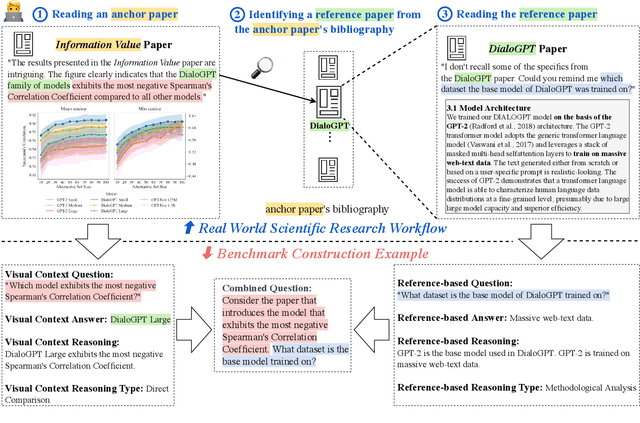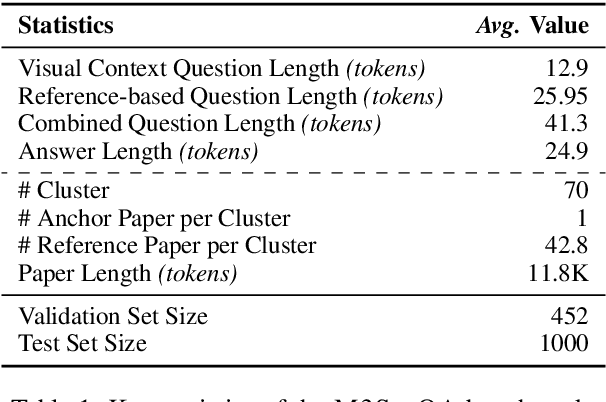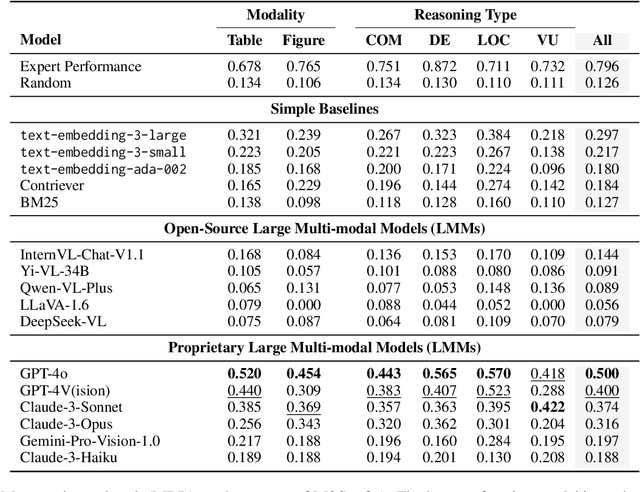Deyuan Li
M3SciQA: A Multi-Modal Multi-Document Scientific QA Benchmark for Evaluating Foundation Models
Nov 06, 2024



Abstract:Existing benchmarks for evaluating foundation models mainly focus on single-document, text-only tasks. However, they often fail to fully capture the complexity of research workflows, which typically involve interpreting non-textual data and gathering information across multiple documents. To address this gap, we introduce M3SciQA, a multi-modal, multi-document scientific question answering benchmark designed for a more comprehensive evaluation of foundation models. M3SciQA consists of 1,452 expert-annotated questions spanning 70 natural language processing paper clusters, where each cluster represents a primary paper along with all its cited documents, mirroring the workflow of comprehending a single paper by requiring multi-modal and multi-document data. With M3SciQA, we conduct a comprehensive evaluation of 18 foundation models. Our results indicate that current foundation models still significantly underperform compared to human experts in multi-modal information retrieval and in reasoning across multiple scientific documents. Additionally, we explore the implications of these findings for the future advancement of applying foundation models in multi-modal scientific literature analysis.
Aligning Multiclass Neural Network Classifier Criterion with Task Performance via $F_β$-Score
May 31, 2024



Abstract:Multiclass neural network classifiers are typically trained using cross-entropy loss. Following training, the performance of this same neural network is evaluated using an application-specific metric based on the multiclass confusion matrix, such as the Macro $F_\beta$-Score. It is questionable whether the use of cross-entropy will yield a classifier that aligns with the intended application-specific performance criteria, particularly in scenarios where there is a need to emphasize one aspect of classifier performance. For example, if greater precision is preferred over recall, the $\beta$ value in the $F_\beta$ evaluation metric can be adjusted accordingly, but the cross-entropy objective remains unaware of this preference during training. We propose a method that addresses this training-evaluation gap for multiclass neural network classifiers such that users can train these models informed by the desired final $F_\beta$-Score. Following prior work in binary classification, we utilize the concepts of the soft-set confusion matrices and a piecewise-linear approximation of the Heaviside step function. Our method extends the $2 \times 2$ binary soft-set confusion matrix to a multiclass $d \times d$ confusion matrix and proposes dynamic adaptation of the threshold value $\tau$, which parameterizes the piecewise-linear Heaviside approximation during run-time. We present a theoretical analysis that shows that our method can be used to optimize for a soft-set based approximation of Macro-$F_\beta$ that is a consistent estimator of Macro-$F_\beta$, and our extensive experiments show the practical effectiveness of our approach.
 Add to Chrome
Add to Chrome Add to Firefox
Add to Firefox Add to Edge
Add to Edge